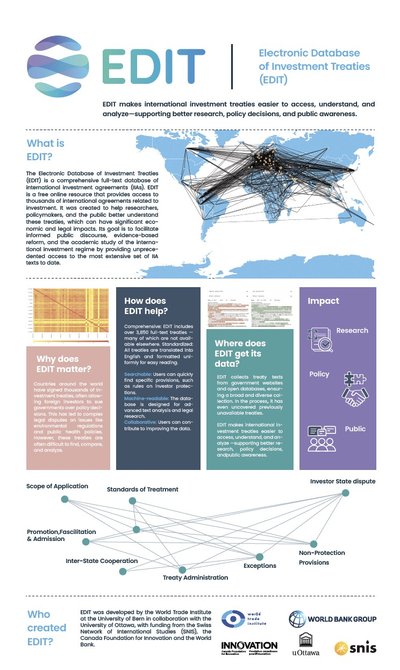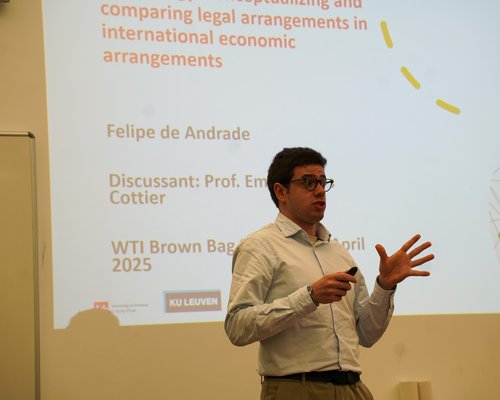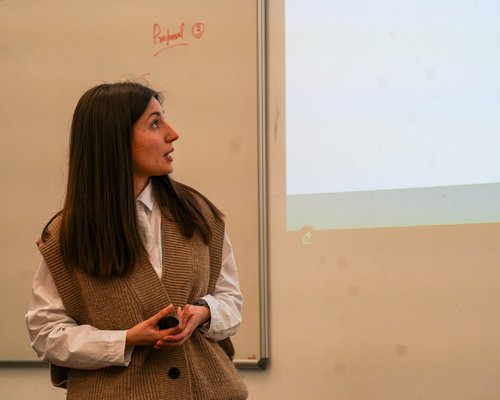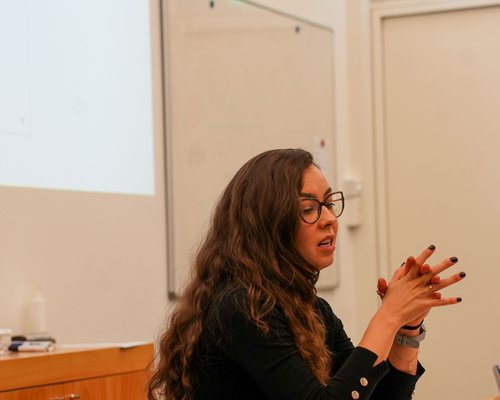Our research projects form the basis of the WTI’s commitment to producing policy-relevant, academically rigorous analysis. Each initiative contributes to global conversations on trade governance, economic integration, and sustainable development. For additional details, publications, or access to datasets, please contact the project leads or visit the WTI Publication page for additional information.
Advancing Knowledge on Global Trade, Investment, and Sustainable Development at the University of Bern
Publications
Discover a wide range of scholarly output by WTI research staff, including books, book chapters, working papers, and peer-reviewed journal articles.
Research Projects
Research is a critical pillar shaping the scope of the World Trade Institute's work. See below for a list of research projects arranged under the three main thematic areas of trade, investment and sustainability, as well as information on past projects.
Library
The WTI library is combined with that of the Institute of European and International Economic Law (IEW), providing an comprehensive collection of literature on international trade issues.
Research at the World Trade Institute
CLIMTrade: Climate Concerns and Trade Policy
Integrating climate objectives into trade policy frameworks
The CLIMTrade project investigates the growing use of trade policy instruments to advance climate goals. It examines how trade and climate change intersect across multilateral platforms, minilateral settings such as Preferential Trade Agreements (PTAs), and unilateral measures that incorporate environmental objectives.
EDIT: Electronic Database of Investment Treaties
A comprehensive resource for investment treaty research and analysis
The Electronic Database of Investment Treaties (EDIT) is a publicly accessible, full-text database of more than 3,850 international investment agreements (IIAs). The database facilitates advanced research, policy analysis, and public engagement by improving access to treaty texts that shape the global investment regime.
DESTA: The Design of Trade Agreements
The DESTA (Design of Trade Agreements) project offers the most comprehensive dataset on the design of preferential trade agreements (PTAs), including customs unions, free trade agreements, and partial scope agreements. Since its inception in 2009, DESTA has contributed to empirical and theoretical work on the legal architecture of trade agreements.
As of December 2023, the database includes over 746 manually coded PTAs covering the period from 1948 to 2023.
DESTA 3.0: Future Developments
A new phase, DESTA 3.0, launches in 2025 and introduces advanced computational methods, including large language models (LLMs), to analyze the content and evolution of PTAs. The project explores how trade agreement design affects global supply chains, marking a significant expansion in both methodology and scope.
DESTA 3.0 will be running over the next four years and explores how large language models (LLMs) can be used to analyze the content of preferential trade agreements (PTAs) and studies evolving dynamics between trade agreements and supply chain management.
Trade Agreements and Democracy (TRADEM)
The TRADEM project investigates the complex interrelationship between preferential trade agreements (PTAs) and democratic governance. The central objective is to identify and define democracy-related content within trade, namely at the World Trade Organisation (WTO) and PTAs, and thereafter discern the conditions under which international trade supports or constrains democratic institutions and processes.
General Equilibrium Effects of Technical Non-Tariff Measures
Evaluating the economic impact of regulatory trade measures
This study investigates the economic effects of changes in standard-like technical NTMs between 2012 and 2017, focusing on their impact on global trade patterns and real income. These include regulatory measures related to product safety, health standards, environmental protection, and labelling. The study underscores the importance of disaggregated modelling in evaluating policy impacts.
In Search of a Geneva Consensus: The Trade-Development Nexus in the GATT/WTO and UNCTAD
This project examines how economic policy doctrines have shaped the trade–development agendas of the GATT/WTO and UNCTAD. It offers the first longitudinal study of the trade–development nexus within these organisations, tracing doctrinal shifts and identifying critical junctures in their evolution.
The research combines three approaches: (1) a theoretical framework explaining how trade doctrines emerge and change in intergovernmental settings; (2) large-scale text analysis of ministerial speeches, policy reports, and flagship publications from both institutions, using topic modelling and other NLP methods to track discursive shifts; and (3) case studies of key turning points, enriched by archival research and interviews with former officials.
By systematically mapping how trade and development doctrines have evolved, the project advances debates in international political economy and development studies while offering policy insights into the institutional and external drivers of change shaping UNCTAD and the WTO today.
Research at the World Trade Institute: focus, research areas and more
Research at the World Trade Institute (WTI) focuses on the legal, economic, and political dimensions of international trade and investment on the doctoral and postdoctoral level. Our interdisciplinary approach brings together scholars and experts to explore the evolving architecture of global economic governance and its implications for sustainability, development, and inclusive growth.
The WTI leads and collaborates on international research initiatives that inform policy and foster dialogue across sectors. Our work spans empirical, theoretical, and policy-oriented research, with a strong emphasis on real-world relevance and impact.
Key research areas include:
- International trade and investment law
- Global economic governance
- Trade and sustainability
- Digital trade and innovation
- Climate, environment, and energy policy
- Development and inclusive trade
Through strategic partnerships, competitive research grants, and active engagement with international organizations, the WTI contributes to shaping a more equitable and resilient global economy.
Visiting Research Fellows at the WTI
Thomas Cottier Award for Best Thesis
Anti-Circumvention Practices: Balanced Approach to Address Loopholes in Anti-Dumping Agreement
This thesis gives a fresh perspective of how the circumvention practices could be effectively reduced upon implementation of the "pre-empteive anti-circumvention mechanism" at the stage of initial anti-dumping investigation.
By: Yuliia Kucheriava
Supervised by: Edwin Vermulst
Can WTO Rules, Disciplines and Incentives Contribute to Fish Stock Conversation?
This paper analyses current multilateral trade rules that interact with some aspects of fish trade. It aims to establish if the current mechanisms available at the WTO can regulate fisheries subsidies and market access for fish and fish products while simultaneously contributing to fish stocks conservation and IUU fishing reduction.
By: Marianna Henud Cresci
Supervised by: Christian Häberli
Setting the Negotiation agenda for the AfCFTA Protocol on Electronic Commerce: A legal perspective
The AfCFTA rules on ecommerce would, therefore, create a legal and institutional framework, that harmonises national and regional digital governance strategies and policies. Such a harmonised regulatory environment would ensure legal clarity for cross-border e-commerce. This paper proposes the criteria for setting the negotiation agenda for the AfCFTA rules on e-commerce, and it also makes a case for expediting the negotiations. Most importantly, the paper seeks to guide the negotiations towards developing a continent-wide digital governance landscape comprising elements of digital trade that cater to the development needs of African countries and ensure equal benefit by all Africans from the advancement of digital technologies in the African economies.
By: Stella Nalwoga
Supervised by: Prof. Dr. Mira Burri
The Establishment of a Multilateral Investment Court: Lessons Learned from the WTO
The Multilateral Investment Court initiative emerged as a result of increased public criticism against investor-state dispute settlement. While such a court may provide a timely solution to the criticisms levelled against the dispute settlement system, its establishment would entail a complete overhaul of the system’s current regime. This thesis analyses the implications of establishing a Multilateral Investment Court for the settlement of investor-state disputes.
By: Faith Abel Abraham
Supervised by: Dr. Rodrigo Polanco
Agricultural Subsidies in the Economy of Ecuador
Many countries use agricultural subsidies to support their farmers, with the aim of fostering the rural economy, supplementing farm income, increasing productivity, and many other aims. However, different types of subsidies have diverse effects, and certain types can have a detrimental impact on the economy, on international trade, as well as on the environment. Often, different types of minimally distorting “green box” subsidies are suggested as an alternative to highly distorting, environmentally adverse “amber box” subsidies. Using the power of Computable General Equilibrium (CGE), we construct a model of the economy of Ecuador, which we use to simulate the alternate application of two different types of subsidies.
By: Gabriela GARCÍA MERCHÁN
Supervised by: Dr. Patrick Tomberger
Access to critical raw materials: Is international investment law fit for purpose?
This master thesis examined how the framework of international investment law allows both ‘resource-rich’ and ‘resource-poor’ countries to safeguard access to CRMs. While this dichotomy often leads to irreconcilable interests, throughout this thesis multiple avenues for balance were considered. Within International Investment Agreements (IIAs), countries can utilise investment screening, carve-outs and exception provisions. Outside IIAs, performance requirements, mining ownership rights, stabilisation clauses and due diligence requirements can act as reciprocal bridges between the two stakeholder groups. Nonetheless, these avenues are only capable of balancing out irreconcilable interests if used under the right terms and conditions.
By: Laura Verbeken
Supervised by: Dr. Rodrigo Polanco
Assessing the U.S. Criticisms on the Delay of WTO Appeal Proceedings
World Trade Organization (WTO) members had initially aimed to restore the dispute settlement mechanism by the end of 2024. However, as of 2025, they have yet to reach a consensus on how the appellate mechanism should function. To resolve the Appellate Body (AB) crisis, it is crucial to address the key criticisms raised against the AB. Among these, a primary concern for the U.S. is the AB’s failure to adhere to the 90-day deadline for issuing reports. This article aimed to examine the importance of prompt dispute resolution to the U.S. and to provide a more comprehensive analysis of the reasons behind the AB’s repeated failure to meet the 90-day review deadline, considering perspectives from both the U.S. and the AB. We further examined the reasons behind the U.S.'s actions, speculating that it attributed the delays to the AB's misconduct because it perceived the AB's rulings over the past decade as unfavorable to its interests. If the true reason for the blockade lies in its dissatisfaction with AB rulings, establishing an appellate mechanism during Trump's presidency is likely to be even more challenging. Reviving the WTO DSS may ultimately rely on the wisdom of WTO members.
By: Chieh Ling Liao
Supervised by: Prof. Manfred Elsig







